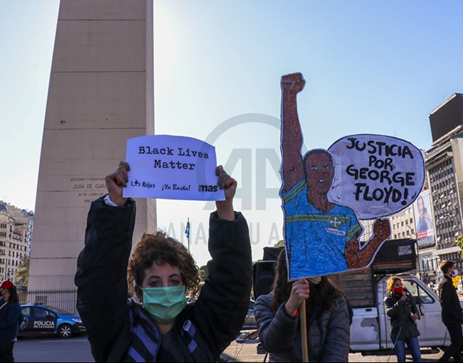Maria Camila Londoño Molina
2021-12-29
The Afro-Argentines, whose families descend mostly from the slave trade, they often feel excluded from history and are confused for foreigners in their own country. Indeed, in Argentina, it is taught in school that all blacks died for independence from Spain in 1813 or during the yellow fever epidemic of that time. Similarly, it wasn’t until the 2010 census that blacks were included as a demographic category, and even then, only 10% of forms include this option. In 1996, the president of Argentina, Carlos Menem, declared that “there are no blacks in Argentina”, strengthening the myth of believing that his country is white and MESTIZO.
The history in the contributions of the black community are not celebrated, nor recognized. Most Afro-Argentines have their roots in Senegal, Cape Vere, and fought to preserve and deliver their culture to Argentine society. Cultural products such as the tango, the CHACARERA, the Argentine roast beef, the groups of drummers must thank the African heritage for its creation. And in recent years, Argentina has gone from underestimating its African roots to rediscovering them, as academics, archaeologists, immigrants, and a fledging civil rights movement have questioned the idea of African and Argentineans are exclusive terms. For example, the tango was created at the end of the 19th century, as a result of the fusion of the culture of African and European immigrants. It is believed that the term tango has its origin in a Niger-Congo term that survived the transatlantic passage along with the slaves. Many organizations, such as the International Committee for the Elimination of Racial Discrimination and the National Institute for Afro-Argentine, Afro-descendant, and African Affairs (Inafro), exist to begin creating change within the Argentine community.
Non-violent civil rights mobilizations in the United States against racism and the death of Afro-Americans spread in the same way to South America, especially to Brazil and Argentina. As in the United States, black Argentines face police brutality. Members of the Senegalese community spoke about how their members are being chased, beaten, shot at and robbed by police simply for selling their wares or sitting outside their houses.
The government of Mauricio Marci, president of Argentina between 2015 and 2019, defunded the institutions that work for the integration of the black community. For this reason, the creation of inafro has allowed, albeit in a reduced way, to be able to concentrate in a specific institution the problems on the black population of Argentina, work in relation to the State, research are elaborated from the perspective of the affected community. Its objective is to create a state agency at the national level that mainstreams the promotion, creation and application of public policies and affirmative actions aimed at the Afro-Argentine, Afro-descendant and African population. At the same time, I intend to visualize and put the historical value, the contribution of Afro descendants to the national identity in promoting the human rights of said group. So the voice of the fight against racism being in the place of the disadvantaged as it is in this case, the Afro-Argentine community.
Nonviolent actions occurred in 2020 in the wake of the death of George Floyd, Breonna Taylor, among others. But the truth is that black activists have been protesting against blackness in Argentina for years. This is the case of the promotion of identity politics through peaceful marches, which have achieved that the problems of otherness that were embodied by the so-called ethnic minorities acquire a greater role in the political field. While the racial reckoning sparked by the murder of George Floyd last year extended far beyond issues of law enforcement inequalities in communities of color, it offers all Argentines the opportunity to hold critical debates that dispel the myths of the disappearance of blacks and minstrelsy and will get to know the role of black Argentines in the construction of Argentina.
Currently, migrants and Afro-descendants in Argentina suffer from unemployment and vulnerability as a result of the COVID-19 pandemic. Indeed, Afro-Argentine activists do not believe that the current global attention of the Black Lives Matter social movement will change any time soon. In Argentina, although there are some official changed such as the introduction in 2013 of the National Day of Argentines on November 8 of each year.
The community is invited to read and investigate in more depth the issue of incidence and nonviolent actions of Black Lives Matter in Argentina, which has recently begun to be discussed since certain features were not taken into account before the country.
Maria Camila Londono Molina is Ecuadorian, has a Multilingual Bachelor’s degree in business and international relations from the Pontifical and Catholic University of Ecuador, and is a writer of publications such as Comparative Analysis of the Strategies of the Afro-American Movements in the United State between the 1960s and 2010s.



